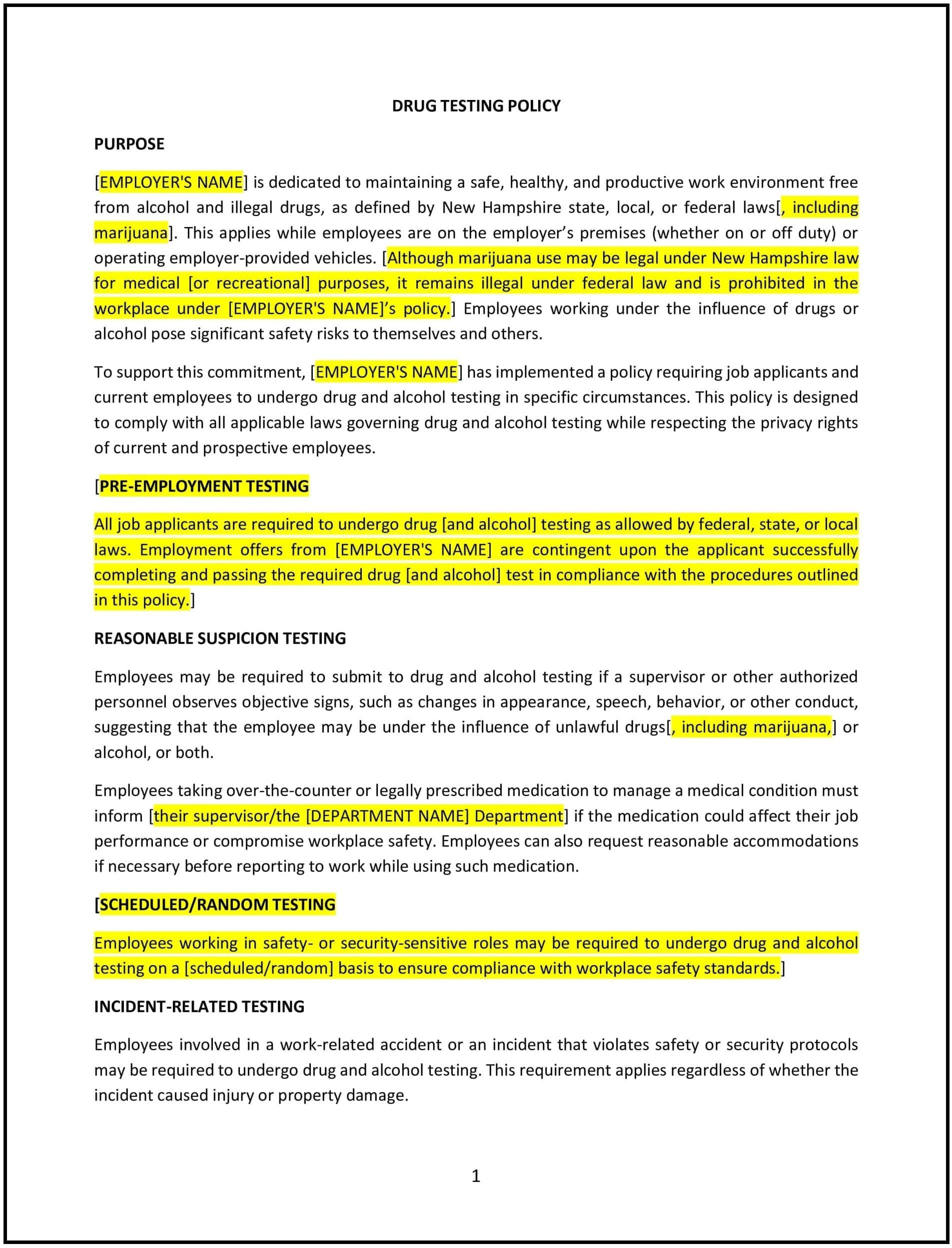Got contracts to review? While you're here for policies, let Cobrief make contract review effortless—start your free review now.

Customize this template for free
Drug testing policy (New Hampshire)
A drug testing policy helps New Hampshire businesses maintain a safe, productive, and compliant work environment by establishing clear guidelines for drug testing procedures. This policy outlines when drug testing will be conducted, the methods used, and how results will be handled, ensuring employees understand their rights and responsibilities.
By implementing this policy, businesses in New Hampshire can reduce workplace accidents, improve employee health and safety, and maintain compliance with state and federal regulations related to drug use in the workplace.
How to use this drug testing policy (New Hampshire)
- Define the purpose: Clearly state the purpose of drug testing, such as ensuring workplace safety, protecting company assets, or complying with industry-specific regulations.
- Outline the testing process: Specify the types of drug testing to be used (e.g., pre-employment, random, reasonable suspicion, post-accident) and the procedures for conducting the tests, including how employees will be notified and what is expected during the testing.
- Set the substances to be tested: Identify which drugs will be tested for, including common substances like marijuana, cocaine, opioids, or prescription medications that may affect performance.
- Explain employee rights: Detail the rights of employees regarding drug testing, including consent, confidentiality, and the ability to challenge or contest results.
- Address consequences for a positive test: Outline the consequences for employees who test positive, including potential disciplinary actions or requirements for rehabilitation, and clarify whether any accommodations will be made for employees with a medical prescription.
- Include drug-free workplace expectations: Establish expectations for maintaining a drug-free workplace, including prohibiting drug use during work hours, on company property, or while performing job-related duties.
- Implement confidentiality: Ensure that the results of drug tests are handled confidentially and shared only with necessary personnel, such as HR or management, in accordance with privacy regulations.
- Review and update: Regularly review and update the policy to reflect changes in New Hampshire regulations or company practices, particularly in regard to evolving drug laws (e.g., medical marijuana legalization).
Benefits of using this drug testing policy (New Hampshire)
This policy provides several benefits for New Hampshire businesses:
- Promotes workplace safety: Drug testing can reduce accidents, injuries, and unsafe behavior by identifying employees who may be impaired and ensuring they are not performing dangerous tasks.
- Improves productivity: By maintaining a drug-free workplace, businesses can improve employee performance, minimize absenteeism, and reduce disruptions caused by substance abuse.
- Protects company reputation: A clear drug testing policy helps businesses demonstrate their commitment to maintaining a safe and professional environment, enhancing their reputation among employees, customers, and regulators.
- Supports legal compliance: Drug testing is essential for businesses that operate in safety-sensitive industries or are subject to government regulations regarding drug-free workplaces.
- Encourages a healthy workplace: The policy can encourage employees to avoid drug use, which supports a healthier, more focused workforce and promotes overall well-being.
Tips for using this drug testing policy (New Hampshire)
- Communicate the policy clearly: Ensure that all employees are aware of the drug testing policy, understand the types of tests that may be conducted, and know the consequences of testing positive.
- Train managers and HR: Ensure that managers and HR personnel are properly trained on how to handle drug testing procedures, including addressing employee concerns, maintaining confidentiality, and enforcing the policy fairly.
- Be consistent: Apply the drug testing policy consistently across all employees to avoid potential discrimination claims or perceptions of unfair treatment.
- Review testing methods: Regularly evaluate the testing methods to ensure they are effective, reliable, and in line with industry standards.
- Stay informed on legal updates: As New Hampshire's drug laws evolve (e.g., medical marijuana legalization), businesses should stay informed on any changes that may impact drug testing procedures or the substances being tested for.